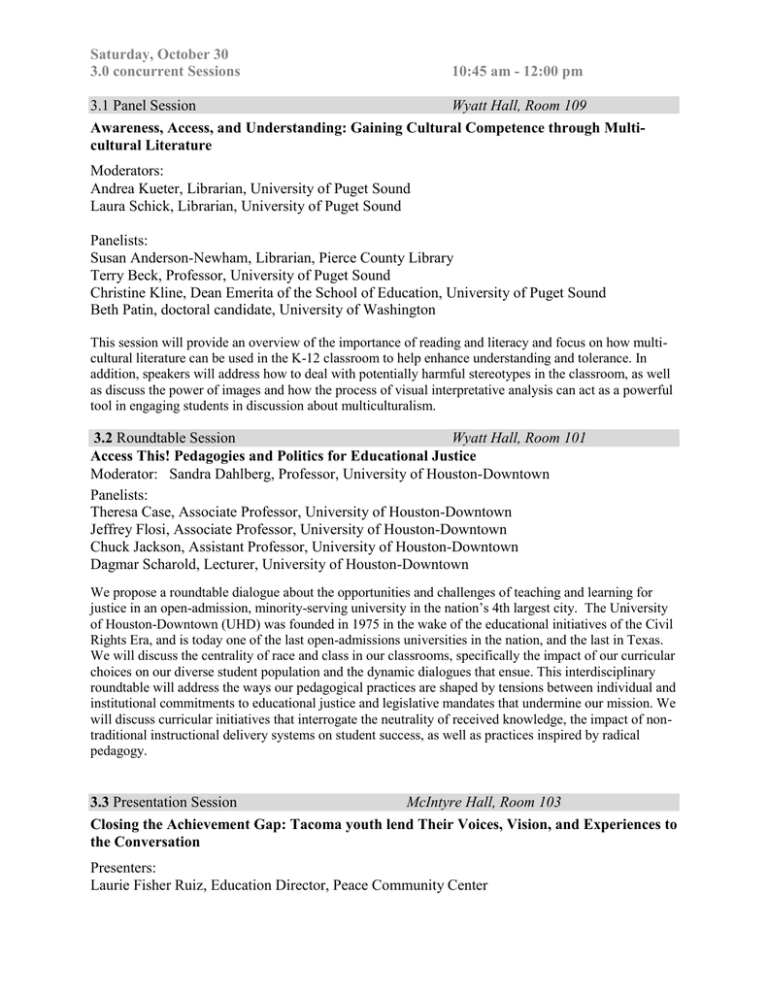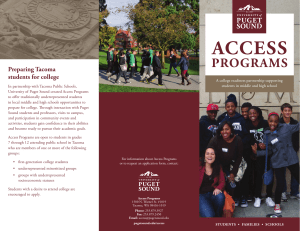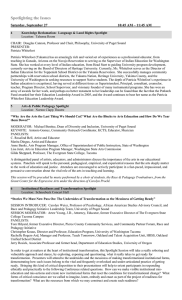Saturday, October 30 3.0 concurrent Sessions 10:45 am - 12:00 pm
advertisement

Saturday, October 30 3.0 concurrent Sessions 10:45 am - 12:00 pm 3.1 Panel Session Wyatt Hall, Room 109 Awareness, Access, and Understanding: Gaining Cultural Competence through Multicultural Literature Moderators: Andrea Kueter, Librarian, University of Puget Sound Laura Schick, Librarian, University of Puget Sound Panelists: Susan Anderson-Newham, Librarian, Pierce County Library Terry Beck, Professor, University of Puget Sound Christine Kline, Dean Emerita of the School of Education, University of Puget Sound Beth Patin, doctoral candidate, University of Washington This session will provide an overview of the importance of reading and literacy and focus on how multicultural literature can be used in the K-12 classroom to help enhance understanding and tolerance. In addition, speakers will address how to deal with potentially harmful stereotypes in the classroom, as well as discuss the power of images and how the process of visual interpretative analysis can act as a powerful tool in engaging students in discussion about multiculturalism. 3.2 Roundtable Session Wyatt Hall, Room 101 Access This! Pedagogies and Politics for Educational Justice Moderator: Sandra Dahlberg, Professor, University of Houston-Downtown Panelists: Theresa Case, Associate Professor, University of Houston-Downtown Jeffrey Flosi, Associate Professor, University of Houston-Downtown Chuck Jackson, Assistant Professor, University of Houston-Downtown Dagmar Scharold, Lecturer, University of Houston-Downtown We propose a roundtable dialogue about the opportunities and challenges of teaching and learning for justice in an open-admission, minority-serving university in the nation‟s 4th largest city. The University of Houston-Downtown (UHD) was founded in 1975 in the wake of the educational initiatives of the Civil Rights Era, and is today one of the last open-admissions universities in the nation, and the last in Texas. We will discuss the centrality of race and class in our classrooms, specifically the impact of our curricular choices on our diverse student population and the dynamic dialogues that ensue. This interdisciplinary roundtable will address the ways our pedagogical practices are shaped by tensions between individual and institutional commitments to educational justice and legislative mandates that undermine our mission. We will discuss curricular initiatives that interrogate the neutrality of received knowledge, the impact of nontraditional instructional delivery systems on student success, as well as practices inspired by radical pedagogy. 3.3 Presentation Session McIntyre Hall, Room 103 Closing the Achievement Gap: Tacoma youth lend Their Voices, Vision, and Experiences to the Conversation Presenters: Laurie Fisher Ruiz, Education Director, Peace Community Center Saturday, October 30 3.0 concurrent Sessions 10:45 am - 12:00 pm Bill Hanawalt, Executive Director, Peace Community Center Using our history as a foil for our present situation, students and staff from Peace Community Center‟s Hilltop Scholars program use their educational experiences to analyze the Tacoma School District‟s African American Achievement Gap, and offer potential solutions through the use of story, video, spoken word, round table conversations, acting, music, and dance. 3.4 Panel Session McIntyre Hall, Room 107 High School Students leading Action for Racial Justice: The Princeton Race Relations Prize as a Model of Partnership and Student initiated Pedagogy about Race Chair: Carolyn Weisz, Professor, University of Puget Sound Panelists: Anthony Brock, undergraduate student, University of Washington, Tacoma Ray Corona, undergraduate student, University of Washington, Bothell Kayla Williams, undergraduate student, University of Washington, Seattle Matt Grant, Principal, Olympia High School John Siegler, Princeton Alum, Ridgecrest Capital Partners The Princeton Race Relations Prize (PRRP) recognizes and supports high school students whose leadership and activism advances the cause of positive race relations. This panel features the inspiring work of three recent student winners of the PRRP from Western Washington who will each talk about their experiences as activists and leaders. Their work includes responses to Neo-Nazi recruitment efforts in Olympia, outreach work that involves schools, parents, and city government, and a program initiated to help Latino students support each other to succeed in school and plan for higher education. The panel also includes presentations by Matt Grant, Principal of Olympia High School, and John Siegler, Chair of the Western Washington Princeton Prize Committee. Panelists will discuss and illustrate the important role of student leadership in pedagogy about race, and the value of partnerships between high schools and institutions of higher education. 3.5 Workshop Session Rausch Auditorium, McIntyre Hall, Room 003 Salsa con Standards: Afro-latin Song & Dance in the Classroom Facilitators: Antonio Davidson-Gómez, Musician/Educator Marisela Fleites-Lear, Professor, Green River Community College Using the Arts to center communities of color in standards-based learning – A hands-on workshop Mr. Antonio Davidson-Gómez is an educator and percussionist focused on a musical dialogue among cultures. He has studied, performed and recorded in various genres with an emphasis in Afro-Latin, Middle Eastern, and Mediterranean music. A veteran teacher of California's K-12 classrooms (bilingual kindergarten & high school social studies, music, and Spanish), Tony designed a high school course on world music and led student ensembles. He recently wrote curricula for the national touring exhibition, American Sabor: Latinos in U.S. Popular Music. Dr. Marisela Fleites-Lear teaches Spanish and Literature at Green River Community College. Her research and publications examine the construction of images of Cuban women from the perspectives of literary, gender and cultural studies. She is also a dancer and the Saturday, October 30 3.0 concurrent Sessions 10:45 am - 12:00 pm director of "Tacoma Flamenca." She has been teaching Flamenco in Tacoma since 2003 (currently at Washington Contemporary Ballet). 3.6 Panel Presentation Collins Memorial Library, McCormick Room, Room 303 Programs that Work in Helping Underrepresented Students Graduate from High School and Attend College Facilitator: Laura Tyler, Science Educator and Author of Pasta Genetics Panelists: Clarence J. Dancer, Director, Seattle Math, Engineering, Science Achievement (MESA) Neiri Carrasco, Director, Yakima Valley/Tri-Cities MESA Lull Mengesha, Seattle MESA Alumnus, The Boeing Company Kim Bobby, Clinical Associate Professor, Chief Diversity Officer, and Director of Summer Academic Challenge, University of Puget Sound This session will highlight programs that work in Washington State by helping underrepresenting minorities attend college declaring STEM majors. 3.7 Panel Presentation Howarth Hall, Room 203 Questioning the Efficacy of Cultural Competence for institutional Change Panelists: Angela Brown, Director of Employment Services, Spokane Public Schools, “Beyond Rhetoric: From Recruitment to Classroom and Beyond” Brown‟s model incorporates both a systemic and personal approach toward cultural competency that allows districts, communities and higher education institutions to impact students before they become teachers and continue that education well after they are hired. While the efforts along the continuum do include strategies to recruit teachers of color, the emphasis of this model is truly on fostering and hiring a highly qualified, culturally responsive staff, regardless of race. Throughout this interactive session, participants will learn about the three stages of this model: pre-college, college partnership, district level. Participants will also have the opportunity to utilize some of the tools and activities to understand what is required to successfully recruit, retain and train a highly qualified and culturally responsive staff. Da Verne Bell & Leilani Nalua’L Russell, Co-directors, Pathways to Excellence Educational Leadership, “Intent? Impact?: Cultural Responsiveness & Competence” This workshop will provide participants with an overview of the essential elements of cultural competence a working definition of cultural competence and provide tools to help eliminate the academic achievement gap through increased cultural responsiveness. 3.8 Panel Session Wyatt Hall, Room 301 What Results Do We Really Want and for Whom?: interrogating the Contexts, Constructions and Effects of Critical and Multicultural Teaching Chair: Tamiko Nimura, Assistant Professor, University of Puget Sound Panelists: Paul Hartman, doctoral candidate, University of Illinois at Chicago, “Interrogating Normalcy in the Classroom: New Directions for „Liberatory‟ Pedagogy” Using my eight grade English classroom in a Chicago Public School as my research site, I Saturday, October 30 3.0 concurrent Sessions 10:45 am - 12:00 pm employ a postmodern/feminist/queer lens and set of research methodologies in order to explore the ways in which the conceptions of ideas like: learning, teaching, emancipation, freedom, and happiness have been developed by myself and my students. I attempt to draw my students into the process of interpretation and creativity by using literature and poetry as a vehicle to delve into societal and personal areas of contention (racism, classism, homophobia, marginalization etc.) and find ways to explore and bridge gaps between our varying conceptions of these ideas. My context-specific exploration offers new ways at approaching the act of teaching and thinking about anti-oppressive pedagogy that may be more authentic and real and that may be applied to other and broader contexts. Zachary Casey, doctoral candidate, University of Minnesota, “Who is Multicultural Education for? The Unintended Consequences of the Demographic Imperative” The author, a white male teacher educator, discusses how the “demographic imperative,” which refers to the overwhelming number of white teachers and the ever-increasing number of students of color in PK-12 schools, has resulted in the understanding and conceptualization of multicultural anti-racist education as being solely for students of color. This emphasis on the demographic imperative as the motivating factor in multicultural work perpetuates white supremacist thinking, as the “problem/imperative” are students of color, not white people who have internalized privileged ways of being in a white supremacist society. In order for the cycle of (multiculturally) under-prepared white teachers to end, we must move beyond the demographic imperative to focus our efforts in multicultural education on both white people and people of color. Yukari Takimoto Amos, Assistant Professor, Central Washington University, “The Effects of Student Evaluation in a Multicultural Education Class on a Non-Native Instructor of Color” This study investigated how a non-native Asian professor who teaches a multicultural education class in a predominantly White university struggled with student evaluation for her/his tenure and promotion. The professor‟s autobiographical narrative revealed that her/his multicultural education courses usually scored significantly lower than the TESL courses and that she/he felt necessary to modify the course content of the multicultural education courses so that White students would not feel uncomfortable. The course modification resulted in the higher student evaluation score, but White students did not learn anything significant to change the current inequality and inequity prevalent in our educational system. 3.9 Panel Session Thompson Hall, Room 193 Race, Prisons and Education: Cultures of Transformation Panelists: Stuart Smithers, University of Puget Sound Mark Cook, Former Black Panther, George Jackson Brigade, Seattle Defenders Association Gilda Sheppard, Professor, The Evergreen State College Ed Mead, Former George Jackson Brigade member, Founder of PrisonArt.org Cody Swift, RiverStyx Foundation Panelists will discuss race, justice, and the transformation of culture through education, from perspectives inside and outside the prison industrial complex. Drawing on almost 50 years of combined prison time, Mark Cook and Ed Mead, former George Jackson Brigade members, will reflect on their attempts to pursue justice and to transform prison culture through education; Gilda Sheppard and Stuart Smithers will discuss the pedagogical priorities of prison education as professors and volunteer instructors; and Cody Saturday, October 30 3.0 concurrent Sessions 10:45 am - 12:00 pm Swift will present on the community and philanthropic work to transform Washington state prisons into communities of learning, and to begin shifting the role of prison as a mechanism for mass imprisonment to a venue for rehabilitation, transformation, and opportunity. Professor Sheppard‟s short documentary with Monroe Correctional Complex students, “When You Learn, You Don‟t Return,” will be presented and discussed. 3.10 Workshop Session Trimble Forum Embedding Cultural Competency Training in Professional Development and Teaching and learning, Part I Facilitator: Eve Bowen, Retired Teacher, Tacoma Public Schools Panelists: Doris Sjoquist, Nooksack Valley School District‟s Cultural Competence Leadership Team Debbi Anderson-Frey, Nooksack Valley School District‟s Cultural Competence Leadership Team Vicky Walkinshaw, Nooksack Valley School District‟s Cultural Competence Leadership Team Hannah Chin-Pratt, Teacher, Lincoln High School Sandy Austin, Instructor, The Center for Educational Leadership, University of Washington, Seattle As the United States' student population demographics continue to change it's imperative that our nation's children are educated in an environment which embraces who they are, and provides quality instruction which prepares them to thrive, positively, in this country. As an educator, I'm sure you've asked the question: How do I meet the instructional needs of all my children? Obviously, there's no silver bullet. However, there are more effective ways. This two-part presentation will allow our panelists to give an overview of their efforts to bring greater cultural competency to their districts' administrators, teachers and staff. 3.11 interactive Workshop Session Wyatt Hall, Room 313 “It’s like, When you…”: Possibilities and Dangers of Models, Analogies and Representation in Teaching Science Facilitators: Fred Hamel, Associate Professor, University of Puget Sound Steven Neshyba, Professor, University of Puget Sound Amy Ryken, Associate Professor, University of Puget Sound Joyce Tamashiro, Instructor, University of Puget Sound Scientists often draw on their own experiences, metaphors, and analogies to understand complex phenomena in everyday terms. Science teachers often adopt a similar approach in teaching. Student response to representations depends on factors including the student‟s cultural background and identity. Impacts of a poor representation can include not merely poor insight into the phenomenon at hand, but a reduced sense of belonging, among others. Participants will discuss and critique “standard” disciplinary representations of selected science concepts, consider criteria for intentionally-constructed ones, and brainstorm methods for creating or discovering new ones. We‟ll explore questions such as · To whom are our representations for scientific concepts best connected? · How might I rethink the representations I use? Saturday, October 30 3.0 concurrent Sessions · · 10:45 am - 12:00 pm How might I invite students to share and create representations of their own? To what extent might we use student representations to rethink our sense of the discipline? 3.12 Panel Session Murray Boardroom, Wheelock Student Center Making Partnerships Work: learning from the Justice Construction-Work of United Community Voices in Tacoma Chair: Tom Hilyard, Director of Community Services, Pierce County, Washington State Panelists: Rev. Arthur C. Banks, President, Tacoma Ministerial Alliance Rev. Gregory W. Christopher, Chairman, Education Committee TMA Anthony Clarke, Psychologist Thomas Dixon, President Emeritus, Tacoma Urban League Carmetrius Parker, Parent Education Committee Member BC (Black Collective) Carla Santorno, Deputy Superintendent, Tacoma Public Schools Rev. Lorraine Sylvester, Vice President of the Board of Directors of Oasis of Hope Foundation Left to their own devices our public schools are failing black children. The Harvard Family Research Project boldly proclaims schools cannot do it alone. Children need multiple opportunities to learn and grow-at home, in school, and in the community. Complementary learning is the idea that a systemic approach-which intentionally integrates both school and nonschool supports can better ensure that all children have the skills they need to succeed. Unified Community Voices agrees with the lessons learned by Harvard and has undertaken the mission of making real in Tacoma the kind of partnership demanded by that knowledge. This roundtable engagement will address the issues raised in complementary learning, the challenges evidenced in partnering with school districts, and the systemic interventions essential to the success of our students.





